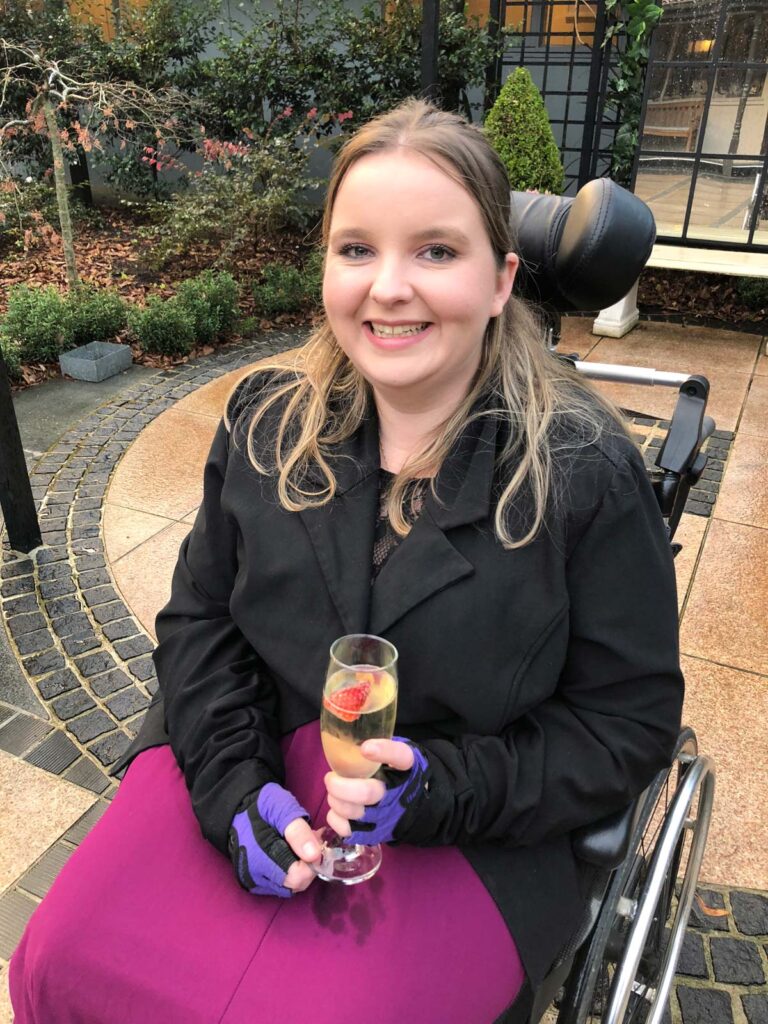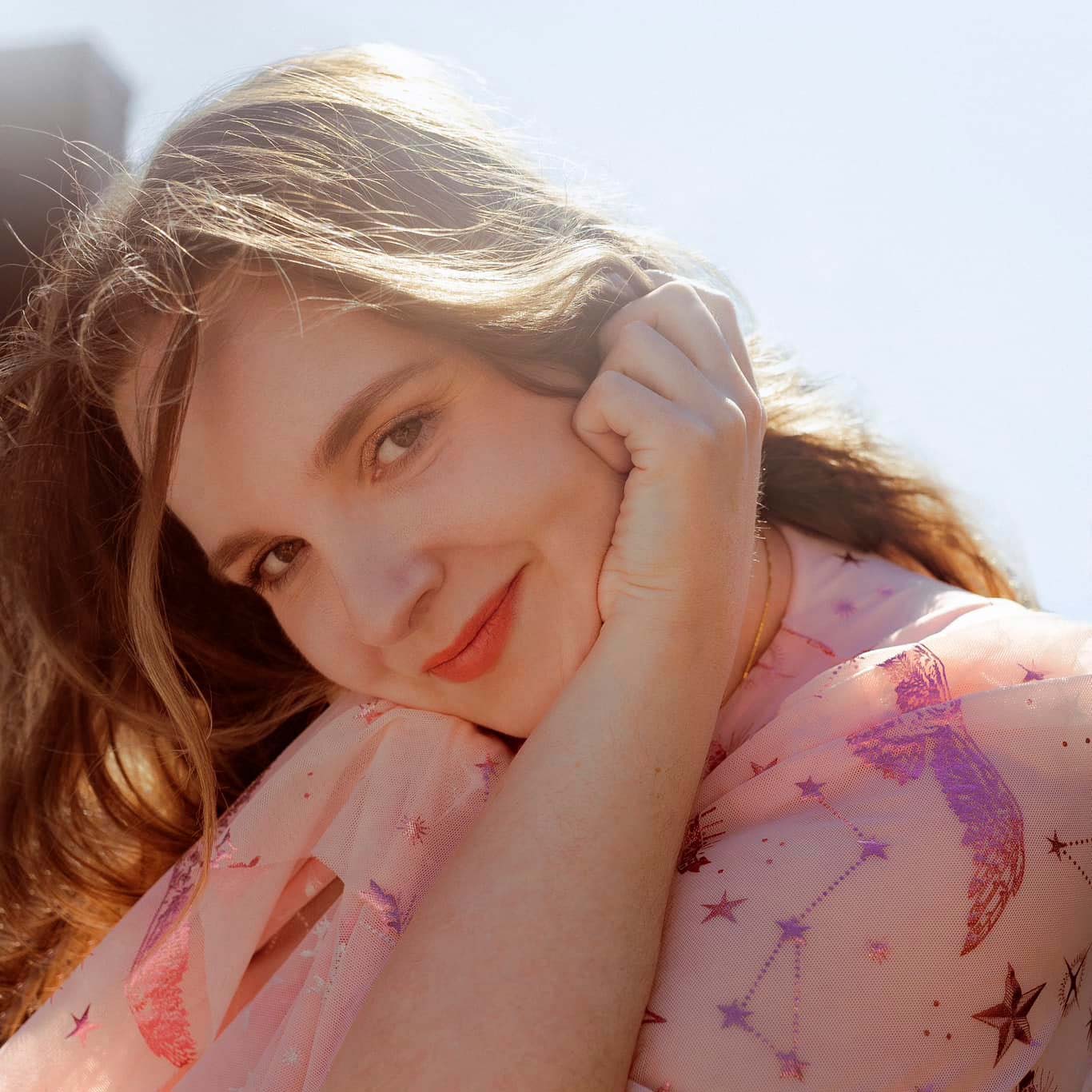By Jess Cochran
The world of dating and relationships can be scary. I’ve experienced this world as an able-bodied teen, a young adult with invisible disabilities and then as a visibly disabled person – with wheelchair, feeding tube, assistance dog and so many braces that I looked part cyborg. And as if that wasn’t enough, I am also autistic (diagnosed just over a year ago at 31 years old), non-binary, lesbian and a victim survivor of sexual assault. I also lost my partner (soon to be fiancée) in my early 20’s and as unfortunate as they are, all these things combined have made this world of dating an even scarier world for me.
There are some very common themes in my experiences regarding the roadblocks faced when dating as a disabled person that are shared by many in the disability community.
(Re-)Establishing intimacy
As a disabled person I find that there are many aspects of our bodies that non-disabled people would usually save for more intimate encounters, that we are forced to share when we first meet strangers (health professionals). The intimacy of those moments is stripped from us as our bodies are frequently inspected, moved, massaged and operated on. Often these encounters occur in extremely impersonal, sterile-feeling and disconnected moments. Additionally, intimate or vulnerable moments of our lives that may be shared with a loved one, with tenderness, kindness and a reassuring touch, are instead discussed regularly with someone sitting across a room with a notepad, studying us.
Trauma
Experiences of neglect, violence and trauma can also have a significant impact on our ability to trust, connect or rebuild comfort in intimate moments. We end up constantly feeling alert and on the edge. In my experience as an autistic person, I find trusting, communicating, reading others’ emotions on texts & dates, and the expectation to be someone I’m not, quite overwhelming and exhausting, which soon leads me to disengage. Trying to keep up with these aspects of dating, often without understanding and patience from the other person, soon ends with me deleting every dating app, cancelling dates and either ghosting the person or being ghosted by them.
Education and Awareness
People usually perceive sex and disability to be incompatible which results in many disabled people never receiving any sexual education, support or the freedom to explore dating, sex, sexuality or intimacy. If there’s a lack of education regarding sexuality and gender identity in disabled communities, it can leave people, who may see themselves reflected within the LGBTQIA+ community, feeling broken, confused, ashamed and alone – not realising that their feelings and attractions are experienced by many others.
Disclosing your disability and access needs
Whether you’re disabled or not, we all have aspects of our lives that we hide until we feel comfortable enough to share them with another person.
When you’re a disabled person beginning to date, there comes a time where you have to consider when and how or how much of will you let someone know about your disabilities, or your access and support needs. Your choice of timing may vary depending on what you’re both looking for in a relationship, prospects of family and even the support you may need during sex.
Being a wheelchair user means that the level of choice about what to disclose and when is taken away. I spent a lot of time debating with myself about when and how to drop the “d” word. Do I put it on my dating app profile? Use some pictures that include my wheelchair? Do I wait until someone wants to catch up and casually asks if we can go somewhere that’s wheelchair accessible?
Assumptions and judgement
Fear of judgement and immediate assumptions made because of my appearance have been a strong barrier for me in the dating world. People often tend to avoid me; they glance at my wheelchair and then walk away. And sometimes it’s the complete opposite, like being asked “If I can have sex” by a complete stranger while waiting for my taxi. There’s also this widely shared opinion that to date a disabled person is to become their carer or ‘nurse’, a certain bias you may often come across.
It’s been 10 years since I lost my partner and 11 years since my physical disabilities deteriorated to the point of needing mobility aids. I’ve tried re-entering the world of dating numerous times and in multiple ways over the last decade. From dating apps, bars, to events and even the rare awkward attempt to talk with someone my friends had noticed flirting with me.

For the first 5 years any interactions usually stopped before we even got to a date, the apps were deleted by day 3, either the other person or I would drop contact within 1-2 weeks, and I’d run back to planning my life as a hermit surrounded by books and my dog.
It’s only since I’ve gained the support and guidance of friends, others in the disability community and those in my formal support team, that I’ve had a bit more success. It wasn’t easy until I found this dreamy LGBTQIA+ club night that had accessibility at the forefront of their planning. They took care of everything from quiet spaces, Auslan interpreters to wheelchair access. They also ensured that the wheelchair users were given space to get to the front of the crowd during stage performances. We could use markers to write anything on ourselves about our sexuality, relationship status, etc. To respect people’s space, they even had special colours assigned to convey if you’re approachable or not. For example, green stood for “you can approach me”, yellow for “I’ll approach if interested” and red for “please leave me be” (Cool? Right!).
I’ll never forget the feeling when I first entered that space. I could tell everyone felt embraced, accepted and safe. They could wear what they wanted, express themselves freely, and enjoy being their genuine self without fear of judgement or prejudice. For the first time, I felt relaxed entering the world of dating and intimacy again, and I was actually excited about what the night might have in store for me. I was welcomed as if I was family and soon felt more at ease amidst strangers than I did with people I’ve known my whole life. I took a plunge signing up for their “love match” event, and guess what? I even approached the kissing booth.
I was buzzing afterwards, and I could not wait for the next event. I was a lot more confident the next time, I wore exactly what I wanted, knowing I didn’t need to hide any aspect of myself. I was embraced by the “regulars” and even ended up spending the night kissing someone for the first time in years. These might seem like small things to many but for me (and my team) we celebrated knowing just how massive a step I’d taken heading back in to a world I’d longed to re-enter for so long. Finding a supportive, accessible, inclusive and safe space along with having the support of my team allowed me to start making, what I hope is the first of many, intimate memories with another person.
